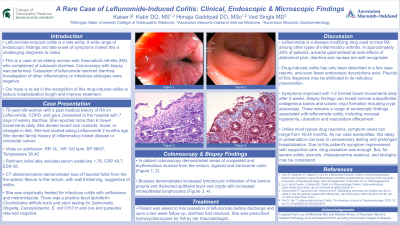Back


Poster Session A - Sunday Afternoon
Category: Colon
A0152 - A Rare Case of Leflunomide-Induced Colitis: Clinical, Endoscopic and Microscopic Findings
Sunday, October 23, 2022
5:00 PM – 7:00 PM ET
Location: Crown Ballroom

Has Audio

Kaiser F. Kabir, DO, MS
Ascension Macomb-Oakland Hospital
Warren, MI
Presenting Author(s)
Kaiser F. Kabir, DO, MS1, Himaja Gaddapati, DO, MS2, Ved Singla, MD3
1Ascension Macomb-Oakland Hospital, Warren, MI; 2Ascension Macomb-Oakland Hospital - Michigan State University College of Medicine, Warren, MI; 3Ascension Macomb Hospital and Ascension Michigan St. John Hospital, Warren, MI
Introduction: Leflunomide-induced colitis is a rare entity, which can be difficult to diagnose. We present a case of an elderly woman with rheumatoid arthritis (RA) who complained of subacute diarrhea. Colonoscopy with biopsy was performed and investigation of inflammatory and infectious causes were negative. Cessation of leflunomide resolved diarrhea. A wide range of endoscopic findings and late-onset of symptoms makes this a challenging diagnosis. Our hope is to aid in the recognition of this drug-induced colitis to reduce hospitalization stays and improve treatment.
Case Description/Methods: A 79-year-old female with a past medical history of RA, COPD and gout, presented to the hospital with seven days of watery diarrhea. She reported more than six bowel movements daily. She denied recent sick contacts, travel, or changes in diet. Patient did not have a family history of inflammatory bowel disease or colorectal cancer. Vitals were stable. CT abdomen/pelvis demonstrated continuous wall thickening of the splenic flexure to rectum. Labs included CRP at 40.7, ESR at 58, and a positive fecal lactoferrin. Patient was empirically treated for infectious colitis with ceftriaxone and metronidazole. Stool cultures and C. difficile toxin were negative. Colonoscopy showed areas of congested and erythematous mucosa from the rectum to the transverse colon. Biopsies demonstrated increased lymphocytic infiltration of the lamina propria, thickened epithelial layer and crypts with increased intraepithelial lymphocytes. Upon further questioning, the patient reported starting leflunomide two months prior. She was asked to trial cessation of leflunomide upon discharge. Upon two week follow up, diarrhea had resolved.
Discussion: Leflunomide is a disease modifying drug used to treat RA among other types of inflammatory arthritis. In approximately 20% of patients, adverse gastrointestinal side effects of abdominal pain, diarrhea and nausea are well recognized. However, drug-induced colitis has only been described in a few case reports, and even fewer endoscopic descriptions exist. Paucity of this diagnosis may be attributed to its nebulous presentation. Unlike most typical drug reactions, symptom onset can range from 18-24 months. As our case exemplifies, this can lead to unnecessary testing and prolonged hospital stays. Due to this patient's symptom improvement with supportive care, we opted for drug cessation. However, for severe colitis, steroids, cholestyramine wash, and biologics may be considered.
Disclosures:
Kaiser F. Kabir, DO, MS1, Himaja Gaddapati, DO, MS2, Ved Singla, MD3. A0152 - A Rare Case of Leflunomide-Induced Colitis: Clinical, Endoscopic and Microscopic Findings, ACG 2022 Annual Scientific Meeting Abstracts. Charlotte, NC: American College of Gastroenterology.
1Ascension Macomb-Oakland Hospital, Warren, MI; 2Ascension Macomb-Oakland Hospital - Michigan State University College of Medicine, Warren, MI; 3Ascension Macomb Hospital and Ascension Michigan St. John Hospital, Warren, MI
Introduction: Leflunomide-induced colitis is a rare entity, which can be difficult to diagnose. We present a case of an elderly woman with rheumatoid arthritis (RA) who complained of subacute diarrhea. Colonoscopy with biopsy was performed and investigation of inflammatory and infectious causes were negative. Cessation of leflunomide resolved diarrhea. A wide range of endoscopic findings and late-onset of symptoms makes this a challenging diagnosis. Our hope is to aid in the recognition of this drug-induced colitis to reduce hospitalization stays and improve treatment.
Case Description/Methods: A 79-year-old female with a past medical history of RA, COPD and gout, presented to the hospital with seven days of watery diarrhea. She reported more than six bowel movements daily. She denied recent sick contacts, travel, or changes in diet. Patient did not have a family history of inflammatory bowel disease or colorectal cancer. Vitals were stable. CT abdomen/pelvis demonstrated continuous wall thickening of the splenic flexure to rectum. Labs included CRP at 40.7, ESR at 58, and a positive fecal lactoferrin. Patient was empirically treated for infectious colitis with ceftriaxone and metronidazole. Stool cultures and C. difficile toxin were negative. Colonoscopy showed areas of congested and erythematous mucosa from the rectum to the transverse colon. Biopsies demonstrated increased lymphocytic infiltration of the lamina propria, thickened epithelial layer and crypts with increased intraepithelial lymphocytes. Upon further questioning, the patient reported starting leflunomide two months prior. She was asked to trial cessation of leflunomide upon discharge. Upon two week follow up, diarrhea had resolved.
Discussion: Leflunomide is a disease modifying drug used to treat RA among other types of inflammatory arthritis. In approximately 20% of patients, adverse gastrointestinal side effects of abdominal pain, diarrhea and nausea are well recognized. However, drug-induced colitis has only been described in a few case reports, and even fewer endoscopic descriptions exist. Paucity of this diagnosis may be attributed to its nebulous presentation. Unlike most typical drug reactions, symptom onset can range from 18-24 months. As our case exemplifies, this can lead to unnecessary testing and prolonged hospital stays. Due to this patient's symptom improvement with supportive care, we opted for drug cessation. However, for severe colitis, steroids, cholestyramine wash, and biologics may be considered.
Disclosures:
Kaiser Kabir indicated no relevant financial relationships.
Himaja Gaddapati indicated no relevant financial relationships.
Ved Singla indicated no relevant financial relationships.
Kaiser F. Kabir, DO, MS1, Himaja Gaddapati, DO, MS2, Ved Singla, MD3. A0152 - A Rare Case of Leflunomide-Induced Colitis: Clinical, Endoscopic and Microscopic Findings, ACG 2022 Annual Scientific Meeting Abstracts. Charlotte, NC: American College of Gastroenterology.
